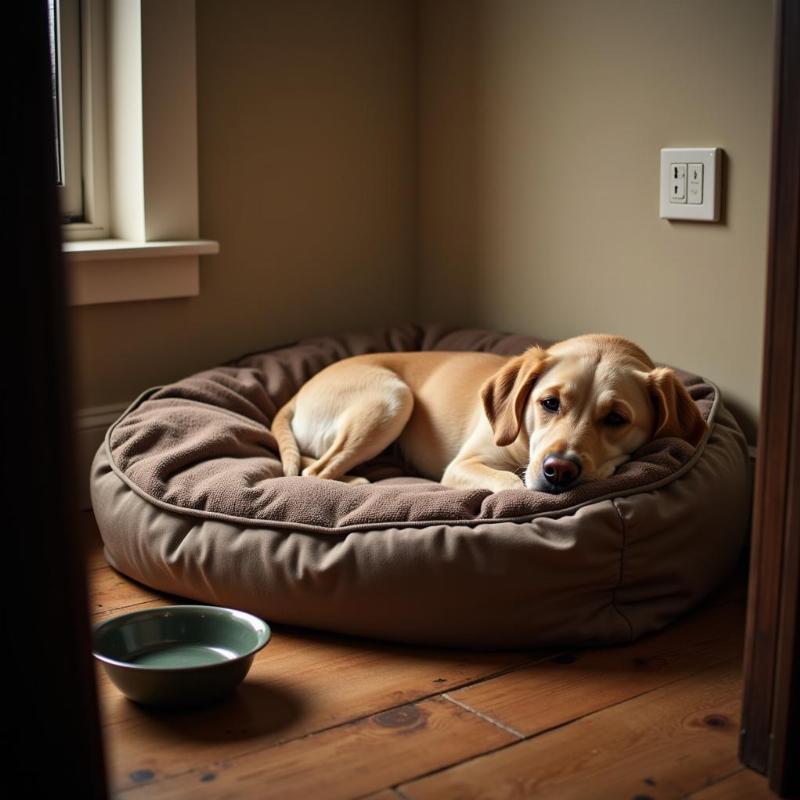When your beloved canine companion isn’t feeling their best, it’s natural to want to do everything you can to help them get back on their paws. Knowing how to provide the best care and support during their illness or recovery can make all the difference. This guide will equip you with the knowledge and resources to help your dog feel better, faster, and ensure a smooth recovery.
Understanding Your Dog’s Illness and Recovery Needs
Before diving into specific remedies, it’s crucial to understand the underlying cause of your dog’s discomfort. Is it a simple upset stomach, a more serious infection, or post-surgical recovery? A proper diagnosis from a qualified veterinarian is the first and most important step. They can determine the root of the problem and recommend the appropriate course of treatment. Don’t hesitate to ask your vet any questions you have regarding your dog’s condition, medication, or recovery process.
Providing Comfort and Care at Home
Once you have a clear understanding of your dog’s needs, you can create a comfortable and supportive environment at home to aid their recovery. This might involve setting up a quiet, cozy space where they can rest undisturbed, providing easily digestible food and fresh water, and administering prescribed medications as directed by your vet. Remember that a sick or recovering dog might be more sensitive to noise and activity, so maintaining a calm atmosphere is key.
 Creating a comfortable environment for a recovering dog
Creating a comfortable environment for a recovering dog
Nutrition and Hydration for a Speedy Recovery
Proper nutrition and hydration are essential for a dog’s healing process. Your veterinarian might recommend a specific diet or suggest adjustments to your dog’s regular food. Make sure your dog has access to fresh, clean water at all times, especially if they’re experiencing vomiting or diarrhea. In some cases, your vet might recommend electrolyte solutions to help replenish lost fluids and minerals.
Monitoring Your Dog’s Progress and Recognizing Potential Complications
Closely monitoring your dog’s progress is vital during their recovery. Keep an eye out for any changes in their behavior, appetite, or bathroom habits. If you notice any worsening symptoms, or anything that concerns you, contact your veterinarian immediately. Early intervention can often prevent minor issues from escalating into more serious complications.
When to Seek Veterinary Attention
While many common ailments can be managed at home with proper care, it’s important to know when to seek professional veterinary help. If your dog’s symptoms persist or worsen despite home care, or if they develop new and concerning symptoms, don’t hesitate to contact your vet. It’s always better to err on the side of caution when it comes to your furry friend’s health.
Conclusion
Helping your dog get well soon involves a combination of veterinary care, home nursing, and a lot of love and patience. By understanding your dog’s illness, providing a supportive environment, and monitoring their progress, you can play a crucial role in their recovery. Remember that a healthy recovery takes time, so be patient with your furry friend and celebrate every small step towards wellness.
FAQ
- How can I tell if my dog is in pain? Changes in behavior like whining, restlessness, loss of appetite, or reluctance to move can indicate pain.
- What should I feed my dog when they are sick? Consult your veterinarian, as they may recommend a bland diet or specific food.
- How can I make my dog comfortable when they are recovering? Provide a quiet, cozy space, soft bedding, and easy access to food and water.
- When should I take my dog back to the vet after they start recovering? Follow your veterinarian’s recommended schedule for check-ups and contact them if you have any concerns.
- What are some signs that my dog’s condition is worsening? Increased lethargy, loss of appetite, persistent vomiting or diarrhea, or difficulty breathing are signs to contact your vet immediately.
- How can I prevent my dog from getting sick in the future? Regular veterinary check-ups, vaccinations, a healthy diet, and exercise are key to preventative care.
- Is it okay to give my dog human medication? Never give your dog human medication without consulting your veterinarian. Many human medications are toxic to dogs.
get well soon card for a dog
dog get well soon basket
get well soon dog gift
get well soon dog card
get well soon dog cards
Beautdogs.us is your premier online destination for all things dog-related in the United States. We provide expert advice on dog breeds, care, and products, offering a trusted resource for both new and experienced dog owners. From health tips to product reviews, Beautdogs.us helps you navigate the joys and challenges of dog ownership. Contact us today for personalized support at [email protected] or call us at +1 501-555-7529.